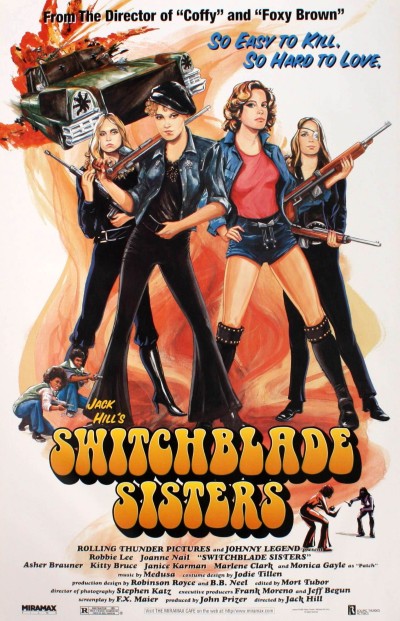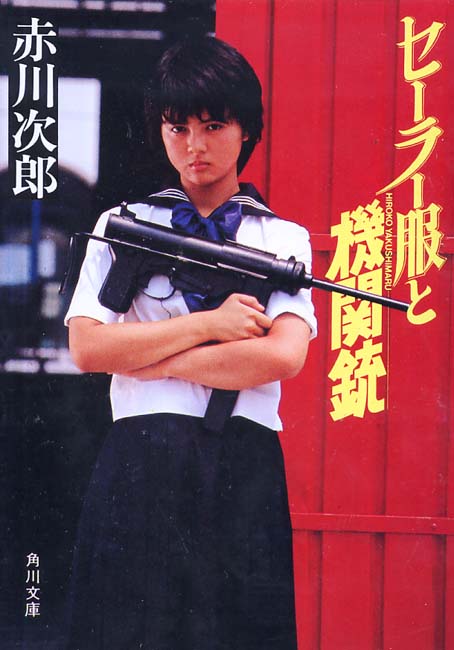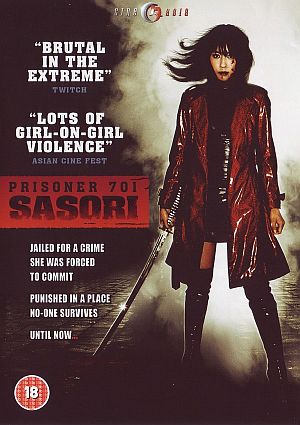★★★
“The Crow-ette”
 Zoe (Adrienne) is driving across country to meet her long-distance boyfriend, Dane (Samuel), when she has the misfortune to stumble into a pack of four rednecks, engaged in their favourite pastime of hunting the local Indians. When they stab one to death right in front of her, it’s clear things are going to end badly for her: and they do, as she is raped, brutalized and left near-dead in a shallow grave. But a conveniently-passing shaman finds her; though his efforts to save her are unsuccessful, the spirit of a dead chief enters Zoe. For, it turns out, he was killed by the ancestors of these same rednecks, and he sees in Zoe the chance to extract his long-awaited and brutal revenge. However, there’s a time-limit involved: since she’s still technically dead, decomposition is setting in…
Zoe (Adrienne) is driving across country to meet her long-distance boyfriend, Dane (Samuel), when she has the misfortune to stumble into a pack of four rednecks, engaged in their favourite pastime of hunting the local Indians. When they stab one to death right in front of her, it’s clear things are going to end badly for her: and they do, as she is raped, brutalized and left near-dead in a shallow grave. But a conveniently-passing shaman finds her; though his efforts to save her are unsuccessful, the spirit of a dead chief enters Zoe. For, it turns out, he was killed by the ancestors of these same rednecks, and he sees in Zoe the chance to extract his long-awaited and brutal revenge. However, there’s a time-limit involved: since she’s still technically dead, decomposition is setting in…
There are a couple of interesting wrinkles here, first that Zoe is deaf. This disability doesn’t play much part in proceedings, which is actually kinda cool: it’s just another aspect of her character. What is rather more relevant, is that Dane is black, so when he heads out in search of her, and crossed the path of the rednecks, it soon becomes very apparent that it isn’t just native Americans they dislike. All of which simply adds impetus to your enthusiasm for them to get their comeuppance, and that certainly happens. The “revenge” part of this rape-revenge flick starts with the possessed Zoe in a bar, yanking someone’s intestines out like they were tickets from an arcade game, and impressively, somehow manages to escalate from there. She gets to wield a variety of traditional weapons, such as a bow & arrow or spear, on the way to the slightly-less traditional tomahawk vs. chainsaw finale.
This only comes close to working if you don’t think about it too much: ideally, at all. Otherwise, you’ll be left wondering about questions like why the shaman didn’t do the sensible thing and call 911; too often, the supernatural aspects are used as an alternative for plot logic. Have to say, though, Adrienne is very good as Zoe, though in some ways, it’s a shame she has to be possessed by a male ghost to get her revenge. I’d have been perfectly happy for her to be intestine-yanking on her own terms, and Dane could also be excised from the plot entirely. Still, the further this heads into excess e.g. point-blank target practice, the more entertaining it is, and the practical effects are more than good enough to counter some distinctly ropey CGI work. As the title of this piece suggests, more than one review has compared this to The Crow – and that’s a reasonable parallel, considering its similar mix of soft-core spirituality and hard-core violence.
Dir: Michael S. Ojeda
Star: Amanda Adrienne, Tom Ardavany, Ronnie Gene Blevins, Marc Anthony Samuel





 It takes real effort for a film that’s barely an hour long, significantly to overstay its welcome, but SBG manages to do exactly that, thanks to its woeful combination of shoddy action and tedious sex scenes. The heroine is teenager Mirai Asamiya (Hashimoto, about as much an actual teenager as I am), who has been transferred to a new school at the behest of her father. Little does she know, at least initially, that she is simply a tool for his revenge, headmaster Bush (Hotaru) having seduced Mirai’s mother away from her husband, and run off with her. To this end, Mirai has been brought up with what we should call, a very particular set of skills: we’ll spare you the details of exactly what the “Venus Crush” involves, but it does lead to the classic line, “He doesn’t know how dangerous your vagina is!” Before she can reach her target, she has to get close by dethroning and replacing his current enforcer of discipline, Susan (Taguchi), and also get past Bush’s lesbian daughter (Kiyokawa).
It takes real effort for a film that’s barely an hour long, significantly to overstay its welcome, but SBG manages to do exactly that, thanks to its woeful combination of shoddy action and tedious sex scenes. The heroine is teenager Mirai Asamiya (Hashimoto, about as much an actual teenager as I am), who has been transferred to a new school at the behest of her father. Little does she know, at least initially, that she is simply a tool for his revenge, headmaster Bush (Hotaru) having seduced Mirai’s mother away from her husband, and run off with her. To this end, Mirai has been brought up with what we should call, a very particular set of skills: we’ll spare you the details of exactly what the “Venus Crush” involves, but it does lead to the classic line, “He doesn’t know how dangerous your vagina is!” Before she can reach her target, she has to get close by dethroning and replacing his current enforcer of discipline, Susan (Taguchi), and also get past Bush’s lesbian daughter (Kiyokawa).
 The briskly-moving piece of seventies trash is much beloved by Quentin Tarantino, and I have to agree with him about its merits. While some elements haven’t stood the test of time well, in other ways, it’s well ahead of its era, and there is, literally, never a dull moment here. Initially, the teenage girl gang are the Dagger Debs, a somewhat subservient bunch to their male counterparts, the Silver Daggers, and their leader, Dominic (Brauner). He’s paired up with the Debs’ #1, Lace (Lee), but has eyes for new girl Maggie (Nail), who is soon impressing Lace with her street smarts and toughness.
The briskly-moving piece of seventies trash is much beloved by Quentin Tarantino, and I have to agree with him about its merits. While some elements haven’t stood the test of time well, in other ways, it’s well ahead of its era, and there is, literally, never a dull moment here. Initially, the teenage girl gang are the Dagger Debs, a somewhat subservient bunch to their male counterparts, the Silver Daggers, and their leader, Dominic (Brauner). He’s paired up with the Debs’ #1, Lace (Lee), but has eyes for new girl Maggie (Nail), who is soon impressing Lace with her street smarts and toughness. It’s 1993, and the peace process in Northern Ireland is cautiously inching forward – though there are some who prefer a more robust method of rebellion, shall we say. Among them is Collette McVeigh (Riseborough) whose little brother was killed by the British Army when she was 12. Along with her brothers Gerry (Gillen, whom you’ll know as Littlefinger from Game of Thrones) and Connor, she is part of the armed struggle, until a mission to plant a bomb in London leads to her capture. MI5 officer Mac (Owen) gives her a stark choice: face a long stretch in prison, separated from her children, or become an informer on her own family. Collette chooses the later, perhaps influenced by Mac showing her it was an IRA sniper who killed her brother. But it soon becomes clear more is at play, with Mac’s boss (Anderson) apparently intent on sacrificing Collette, in order to protect another, more valuable asset.
It’s 1993, and the peace process in Northern Ireland is cautiously inching forward – though there are some who prefer a more robust method of rebellion, shall we say. Among them is Collette McVeigh (Riseborough) whose little brother was killed by the British Army when she was 12. Along with her brothers Gerry (Gillen, whom you’ll know as Littlefinger from Game of Thrones) and Connor, she is part of the armed struggle, until a mission to plant a bomb in London leads to her capture. MI5 officer Mac (Owen) gives her a stark choice: face a long stretch in prison, separated from her children, or become an informer on her own family. Collette chooses the later, perhaps influenced by Mac showing her it was an IRA sniper who killed her brother. But it soon becomes clear more is at play, with Mac’s boss (Anderson) apparently intent on sacrificing Collette, in order to protect another, more valuable asset. Okay, I’m sure there are worse films on Netflix. Somewhere. But I haven’t yet found them/ Combining cheapjack production values with poor performances and woefully bad attempts at social commentary, the occasional decent fight sequence aren’t able to overcome the very significant negatives. The heroine is Noriko (Hellquist), who is raped by the Wall Street bigwig, Ronald Brooks, for whom she works – and then framed for his murder. She creates a secret identity, Shinobi Girl: as well as seeking to expose the real killer, she acts as the protector of the 99%, hunting down and dispatching the decadent uber-rich. They are led by Brooks’ widow (Fahey), and commit heinous crimes with no fear of legal reprisal, up to and including orgies of murder and cannibalism (!).
Okay, I’m sure there are worse films on Netflix. Somewhere. But I haven’t yet found them/ Combining cheapjack production values with poor performances and woefully bad attempts at social commentary, the occasional decent fight sequence aren’t able to overcome the very significant negatives. The heroine is Noriko (Hellquist), who is raped by the Wall Street bigwig, Ronald Brooks, for whom she works – and then framed for his murder. She creates a secret identity, Shinobi Girl: as well as seeking to expose the real killer, she acts as the protector of the 99%, hunting down and dispatching the decadent uber-rich. They are led by Brooks’ widow (Fahey), and commit heinous crimes with no fear of legal reprisal, up to and including orgies of murder and cannibalism (!). Purely coincidental that I viewed this not long after
Purely coincidental that I viewed this not long after 

 This can only be described as a mess, albeit a crappily entertaining one, with a leading lady in Phillips, who almost made it to the Olympics, being described as “the next Mary-Lou (Retton)”, before trying her hand in low-budget action. She plays an international-level gymnast and martial-arts expert, whose parents are, unknown to her, involved in a plot involving the launch codes for Ukrainian missiles. The mother is killed by villainous Brit, Carla Davis (Douglas – apparently Jenny Agutter was unavailable. Or, more likely, too expensive), who wants to get her claws on the codes for some reason. Hey, she’s a villain: what more does she need? She captures Dad (Henriksen), but not before he has given his daugher the first in a series of clues which will lead her and investigative journalist Rex Beechum (Thomerson), apparently with an unlimited expense account, around the globe from Rome to Kuala Lumpur to Hong Kong and Athens, bumping into various unexpected siblings along the way.
This can only be described as a mess, albeit a crappily entertaining one, with a leading lady in Phillips, who almost made it to the Olympics, being described as “the next Mary-Lou (Retton)”, before trying her hand in low-budget action. She plays an international-level gymnast and martial-arts expert, whose parents are, unknown to her, involved in a plot involving the launch codes for Ukrainian missiles. The mother is killed by villainous Brit, Carla Davis (Douglas – apparently Jenny Agutter was unavailable. Or, more likely, too expensive), who wants to get her claws on the codes for some reason. Hey, she’s a villain: what more does she need? She captures Dad (Henriksen), but not before he has given his daugher the first in a series of clues which will lead her and investigative journalist Rex Beechum (Thomerson), apparently with an unlimited expense account, around the globe from Rome to Kuala Lumpur to Hong Kong and Athens, bumping into various unexpected siblings along the way. While sharing the heroine’s name with the renowned Female Convict Scorpion series, it’s not clear how much of an official remake this is: it’s supposedly based on a manga series, which I don’t quite recall being the case with its predecessors (it was a while ago I saw the original, though – must get round to re-viewing it for the site at some point soon). The concept is not dissimilar, however: Sasori (Mizuno) is sent to prison, where she is brutalized, but eventually escapes, and seeks vengeance on those who were responsible for putting her inside to begin with. However, it’s really poor at providing motive or explanation: for example, after Sasori is left for dead, her body is dumped outside the prison, where a corpse-collector (HK veteran, Simon Yam) rescues and revives her, before training her in the ways of top-end martial arts and sending Sasori on her way. Why? Who knows. Similarly, the reason why our heroine is in prison at all, raises more questions than it answers.
While sharing the heroine’s name with the renowned Female Convict Scorpion series, it’s not clear how much of an official remake this is: it’s supposedly based on a manga series, which I don’t quite recall being the case with its predecessors (it was a while ago I saw the original, though – must get round to re-viewing it for the site at some point soon). The concept is not dissimilar, however: Sasori (Mizuno) is sent to prison, where she is brutalized, but eventually escapes, and seeks vengeance on those who were responsible for putting her inside to begin with. However, it’s really poor at providing motive or explanation: for example, after Sasori is left for dead, her body is dumped outside the prison, where a corpse-collector (HK veteran, Simon Yam) rescues and revives her, before training her in the ways of top-end martial arts and sending Sasori on her way. Why? Who knows. Similarly, the reason why our heroine is in prison at all, raises more questions than it answers.